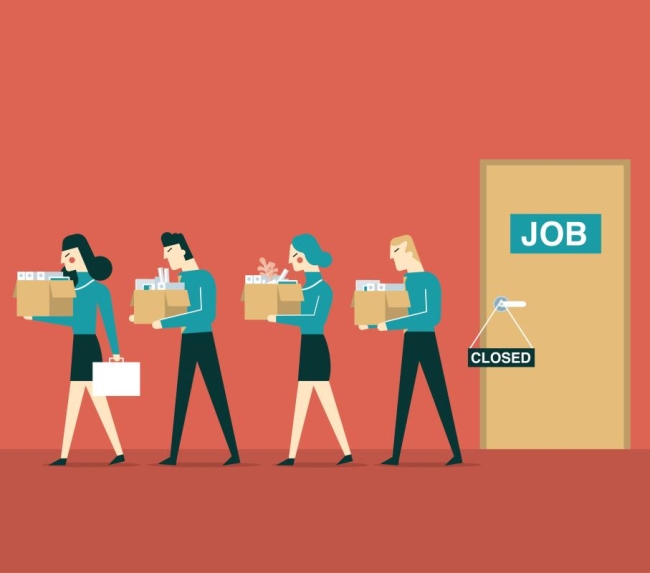You have /5 articles left.
Sign up for a free account or log in.

Sorbetto/digitalvision vectors/getty images
I planned to retire at age 70. The business part of my brain insisted that was the most fiscally responsible path—maximizing my Social Security, funding my IRAs and pushing my modest pension from the state to its greatest value after working 14 years in finance middle management at the University of North Carolina at Chapel Hill. I would be leaving not only the university but also closing out a 40-plus-year career.
My plan was prudent. It was achievable. I was in planning mode. I ran the financial projections constantly to reassure myself and stay on track.
Why did this not happen for me?
The pandemic entered the picture in March of 2020. A once unthinkable environment for the workplace became the norm. The institution’s risk-management exercises for operating remotely, prepared years ago while rolling our eyes, were actually useful. My team and I retreated to our homes, and I set up my own office in a living room nook with a bay window. From there, while watching the birds and deer, I conducted business in the form of Zoom meetings, phone calls and extensive email correspondence.
To the outside world, it looked like business as usual, but the interior view was much different. While our risk-management exercises prepared us for getting the work done, I had few, if any, human resource tools to help me motivate my team or myself. It is hard to remember when I first realized that I was fading—maybe half a year into the remote format? I craved human contact and felt very alone. I looked forward to Zoom meetings with the cameras on just so I could see people.
I didn’t admit this to myself for many months: I was starting to unconsciously prepare myself and my team for operating without a leader in the event one could not be hired if I fled. I was grateful to have employment but felt extraordinarily guilty because I was not able to rise above the sadness that I experienced every morning as I logged on.
One day, I found myself arguing with my supervisor over recognition awards given to finance employees. I nominated people every year, and my nominations were historically turned down—something I’d always managed to simply accept. But this time, instead of graciously saying thank you for the opportunity to nominate my deserving team members, I screamed at my supervisor about how terrible the award system was. I then informed him that I needed a week away from my laptop, and I asked him not to bother me while I was on leave.
That outburst would have been the end of me in many organizations, but my supervisor approved the time off, probably figuring that had I stayed, it would have only gotten worse. He was right. I had to get away from the work and my bay window, although a week wasn’t even close to enough time to clear my head.
Other warning lights were flashing. I was drinking too much. I looked forward to 5 p.m. just so I could pop open the first of two beers, and I added wine more often than I cared to admit. I ate whatever I wanted, in quantities that made no sense. Inside, I was screaming, “I hate this.” I watched several Netflix series over and over. There was something about the repetitive dialogue that I found soothing.
I hired a counselor, and while I was not willing to fully admit what a dreadful state I was in, I told her I wanted to explore getting ready for retirement. My heart was finally demanding a seat at my brain’s planning table.
An Oldster’s Retirement Surge
While this turmoil was going on in my living room, I watched the world struggling, too. As I read newspapers and watched the news every night, I was consumed by fear, sadness and the loss of anything hopeful. I felt guilty that I was flourishing financially and actually saving money while other people could barely keep the lights on. I was aware that employment prospects were bad for anyone in public-facing positions.
I also heard, almost daily, about women bearing the brunt of the economic pain of job loss for a variety of reasons. People of color were disproportionally affected by job loss. Childcare concerns were a major pain point, and homeschooling by people not equipped to provide it was added to parental responsibilities. Oddly, I did not hear much about employment for oldsters or how we struggled and then recovered—or didn’t.
As it turned out, older workers may have been reluctant to stay in the workforce out of fear of catching COVID-19 and generally did not return to work at the same rates as younger workers, even after offices began to reopen. In their research for the New School’s Schwartz Center for Economic Policy Analysis, Owen Davis and Siavash Radpour found a deep decline in percentages of older workers returning to employment and a surge in retirements in 2021.
I also learned that the number of people old enough to collect Social Security had increased significantly in the last two years, according to Richard Fry, a senior researcher at the Pew Research Center, in “Amid the Pandemic, a Rising Share of Older U.S. Adults Are Now Retired.” So is the explanation for an increasing number of older adults opting for retirement simply because there are more of us? For those of us retiring voluntarily, it seems not. As a result of skyrocketing home prices adding to personal wealth and, until recently, the surging stock market, perhaps we were a little warmer and fuzzier about jumping ship from our jobs. But I speculate that many recent retirements would not have occurred until later had the pandemic not been a factor.
PBS Newshour’s economic correspondent, Paul Solman, told stories of several newly retired boomers who left their jobs voluntarily after examining their financial status and longevity prospects. Mental health and ability to spend time with their families were primary reasons. One retiree from South Carolina was driven over the edge by Zoom meetings. A 77-year-old school bus driver questioned the wisdom of spending several hours per day with 30 to 40 elementary school children in an enclosed metal tube on wheels. All wished to avoid the stresses of COVID-19, and many speculated on the meaning of life and how they wished to spend their remaining years.
Knowing that my university was experiencing its own challenges and uncertainties surrounding employment during the pandemic, I reached out to a trusted source there for information. I learned that the human resources area supporting retirements was operating on overload, and that COVID-19 fatigue was pushing employee turnover several percentage points higher than normal. My source also shared that it was not unreasonable to expect retirements to increase 40 percent in fiscal year 2022 over the previous two years.
Small Favors
I’m now part of that 40 percent. I got used to the idea of less money saved and decided that my mental health was worth the difference. Nine months after leaving, I’m even more convinced that it was the best decision given the cards dealt to me at the time.
I’m exercising. I’m consuming alcohol in moderation and eating consciously. I’m happier. I miss absolutely nothing about work except my co-workers. I’ve looked into a part-time job but shudder at the thought of managerial or supervisory responsibilities. I’ve done things like unsubscribing from my favorite online shopping sites to avoid the temptation of a great sale. I’ve landed on my feet, albeit earlier than planned, at age 68.
What was I expecting, anyway? Those of us vested in our careers often still hang on to the perception of entering retirement with a script. That perception leads to feelings of failure, that we are not “doing this right.” The rigidity of a plan only leads to worry.
If limited to offering one piece of advice, I would say, “Don’t listen to people more than 10 years younger than you.” They haven’t actively considered their own options yet. Their input will only fan the flames of uncertainty. With the benefit of hindsight, and lots of input from my fellow seniors, I have learned that there are few perfect retirement plans. Yes, the pandemic made a difference in mine, but so what? Life situations change daily. Our health fluctuates; our financial pictures fluctuate. Family and friends change; our social circles expand and contract. People move, and people die. On the happier side, marriages happen, bringing us new friends and relatives and the prospect of sweet babies to cuddle and care for.
Now, when someone asks me about what I am doing in retirement, I say, “Whatever I want.” (Although that’s not completely true, as I’m on a tighter budget.) I rejoice in yoga class because I can touch my toes. I joined a writers’ group. I have new friends at the senior center and can help anyone struggling with the computerized sign-in system because I’m one of the younger ones who can still see the screen.
And I worry less about my “legacy” in the working world and think more about what I can give back in the form of small favors. I received a text message recently from a former team member with a picture from her graduation ceremony. She was radiant in her cap and gown and thanked me for my help and encouragement. My own accomplishments can take the back seat going forward, as I now cheer for others.




